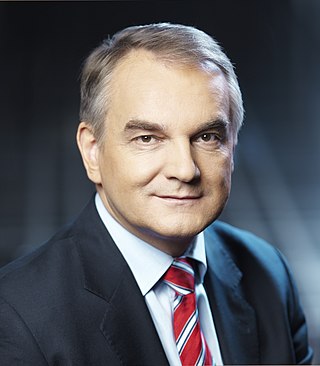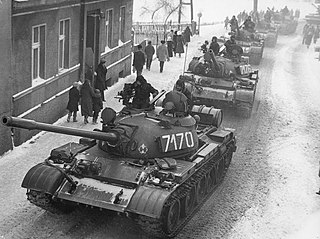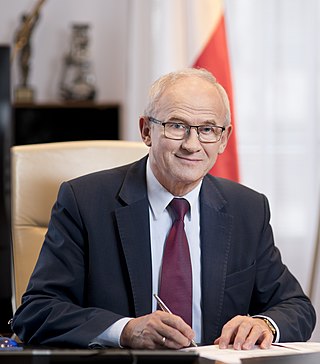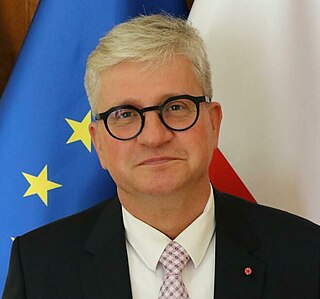
Wojciech Witold Jaruzelski was a Polish military general,politician and de facto leader of the Polish People's Republic from 1981 until 1989. He was the First Secretary of the Polish United Workers' Party between 1981 and 1989,making him the last leader of the Polish People's Republic. Jaruzelski served as Prime Minister from 1981 to 1985,the Chairman of the Council of State from 1985 to 1989 and briefly as President of Poland from 1989 to 1990,when the office of President was restored after 37 years. He was also the last commander-in-chief of the Polish People's Army,which in 1990 became the Polish Armed Forces.

Lech Aleksander Kaczyński was a Polish politician who served as the city mayor of Warsaw from 2002 until 2005,and as President of Poland from 2005 until his death in 2010. Before his tenure as president,he previously served as President of the Supreme Audit Office from 1992 to 1995 and later Minister of Justice and Public Prosecutor General in Jerzy Buzek's cabinet from 2000 until his dismissal in July 2001.

Józef Oleksy was a Polish left-wing politician who served as Prime Minister of Poland from 7 March 1995 to 7 February 1996,when he resigned due to espionage allegations. He was chairman of the Democratic Left Alliance.

Jan Ferdynand Olszewski was a Polish conservative lawyer and politician who served as the Prime Minister of Poland for five months between December 1991 and early June 1992 and later became a leading figure of the conservative Movement for the Reconstruction of Poland.

Waldemar Pawlak is a Polish politician. He has twice served as Prime Minister of Poland,briefly in 1992 and again from 1993 to 1995. From November 2007 to November 2012 he served as Deputy Prime Minister and the Minister of Economy. Pawlak remains Poland's youngest prime minister to date.

Bronisław Geremek was a Polish social historian and politician. He was an opposition activist in Communist Poland and participated in the Polish Round Table Agreement.

Tadeusz Mazowiecki was a Polish author,journalist,philanthropist and politician,formerly one of the leaders of the Solidarity movement,and the first non-communist Polish prime minister since 1946,having held the post from 1989 to 1991.

Presidential elections were held in Poland on 8 October 2000. Incumbent President Aleksander Kwaśniewski was easily re-elected in the first round with more than 50% of the vote,the only time a direct presidential election in Poland has not gone to a second round.

Jan Krzysztof Bielecki is a Polish liberal politician and economist. A leading figure of the Gdańsk-based Liberal Democratic Congress in the early 1990s,Bielecki served as Prime Minister of Poland for most of 1991. In his post-political career,Bielecki served as president of Bank Pekao between 2003 and 2010,and served as the president of the Polish Institute of International Affairs between 2009 and 2015. Since the early 2000s,Bielecki has been a member of the Civic Platform party. In 2010,the Warsaw Business Journal described Bielecki as one of the most respected economists in Poland.

Antoni Macierewicz is a Polish politician and the former Minister of National Defence. He previously served as the Minister of Internal Affairs,Head of the Military Counterintelligence Service,and Minister of State in the Ministry of National Defence.

Martial law in Poland existed between 13 December 1981 and 22 July 1983. The government of the Polish People's Republic drastically restricted everyday life by introducing martial law and a military junta in an attempt to counter political opposition,in particular the Solidarity movement.

Bronisław Maria Komorowski is a Polish politician and historian who served as President of Poland from 2010 to 2015.

Krzysztof Józef Tchórzewski is a Polish engineer and politician. He serves as the Minister of Energy in the cabinet of Beata Szydło. Prior to this,Tchórzewski was a minister without portfolio.

Andrzej Rzepliński is a Polish lawyer,Professor of Jurisprudence,human right expert,member of International Helsinki Federation for Human Rights,a judge of the Polish Constitutional Tribunal from 2007 and its president from 2010 to 2016.

Piotr Grzegorz Woźniak is a Polish public servant and geologist. Between 2005 and 2007 he served as Minister of Economy,between 2011 and 2013 he was Undersecretary of State at the Ministry of Environment and Chief State Geologist,since 2016 he has been serving as President of the Management Board of the Polish Oil and Gas Company (PGNiG).

Lech Wałęsa is a Polish statesman,dissident,and Nobel Peace Prize laureate,who served as the president of Poland between 1990 and 1995. After winning the 1990 election,Wałęsa became the first democratically elected president of Poland since 1926 and the first-ever Polish president elected by popular vote. A shipyard electrician by trade,Wałęsa became the leader of the Solidarity movement and led a successful pro-democratic effort,which in 1989 ended Communist rule in Poland and ushered in the end of the Cold War.

Jerzy Żyżyński is a Polish economist,a professor of economics,a specialist in management,economic commentator,since 2011 election member of parliament.

The Cabinet of Tadeusz Mazowiecki,led by Prime Minister Tadeusz Mazowiecki,came to power following the 1989 legislative election. He was nominated by the President as the Prime Minister on 24 August 1989 in order to form a new government after the Sejm rejected the Communist cabinet of Czesław Kiszczak,and subsequently obtained the mandatory motion of confidence in the Sejm on 12 September 1989. The cabinet resigned on 25 November 1990,and the Sejm accepted the resignation of the cabinet on 14 December,though it continued to perform its duties until the formation of the Cabinet of Jan Krzysztof Bielecki on 4 January 1991.

Piotr Ignacy Iwaszkiewicz was a Polish political historian,translator and diplomat,serving as ambassador to Uzbekistan (2015–2020).

PawełKrzysztof Soloch is a Polish politician and official. Since August 2023 he represents Poland as the Ambassador to Romania. Prior to that,he was the Head of the National Security Bureau (2015–2022).



















